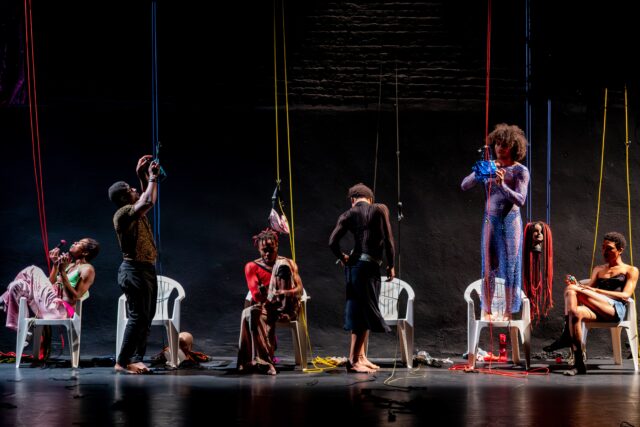
For the English version, please, scroll down
BERLINO – L’11 agosto 2023, presso l’HAU2, nell’ambito della 35esima edizione del Tanz im August è andato in scena Prophétique (on est déjà né.es) di Nadia Beugré.
All’ingresso degli spettatori in sala, i componenti dalla Libr’Arts sono già in scena con musica a tutto volume. Immersi nella tipica atmosfera ballroom, sfilano e si esibiscono in passi di voguing, tornato molto di moda negli ultimi anni.
Nella prima parte le black and latino trans travolgono il pubblico con la loro caotica e chiassosa allegria. Dopo un momento ‘lirico’ in cui, sedute sulle sedie disposte in fila sul fondale, si smaltano le unghie, si truccano e si pettinano sulle note del Bolero di Ravel, si passa a una bizzarra scena in cui iniziano tutte ad abbaiare mentre si muovono a quattro zampe. Da qui si susseguono numerose gag, sempre accompagnate da provocazioni, doppi sensi ed espliciti riferimenti sessuali, in cui viene spesso coinvolto il pubblico. Le trans rivendicano il loro spazio in scena e nella società. Senza autocommiserarsi, raccontano drammi personali, storie di outsider, storie di chi ha vissuto ai margini ma che, nonostante genitori snaturati o discriminazioni, ha trovato una comunità, una famiglia.
Lo spettacolo, che ha l’indubbio merito di intrattenere gli spettatori divertendoli, poteva essere maggiormente incentrato sui momenti performativi invece che sui monologhi, senza, con ciò, tradire il messaggio di affermazione di genere e di inclusione.
Alla fine resta un dubbio: la standing ovation del pubblico è per Prophétique (on est déjà né.es) o per la questione di genere?
Ballroom, voguing and gender issue
BERLIN – On August 11th, 2023, at the HAU2, as part of the 35th edition of Tanz im August, Prophétique (on est déjà né.es) by Nadia Beugré was on.
As the audience enter the theatre, the members of Libr’Arts are already on stage with loud music. Immersed in the typical ballroom atmosphere, they catwalk and perform voguing steps, which, for some years, has been very trendy.
In the first part, the black and latino trans overwhelm the audience with their chaotic and loud joy. After a ‘lyrical’ moment in which, sitting on the chairs arranged in a row on the backdrop, they polish their nails, put on their make-up and comb their hair while Ravel’s Bolero plays, we move on to a bizarre scene in which they all start barking as they move on all fours. From this moment, numerous gags follow one another, always accompanied by provocations, double entendres and explicit sexual references, in which the public is often involved. Trans women claim their place on stage and in society. Without self-pity, they tell personal dramas, stories of outsiders, stories of people who have lived on the margins but who, despite distorted parents or discrimination, have found a community, a family.
The show, which has the undoubted merit of entertaining the audience, could have been more focused on performative moments instead of monologues, without thereby betraying the message of gender affirmation and inclusion.
In the end, a doubt remains: is the audience’s standing ovation for Prophétique (on est déjà né.es) or for the gender issue?














































